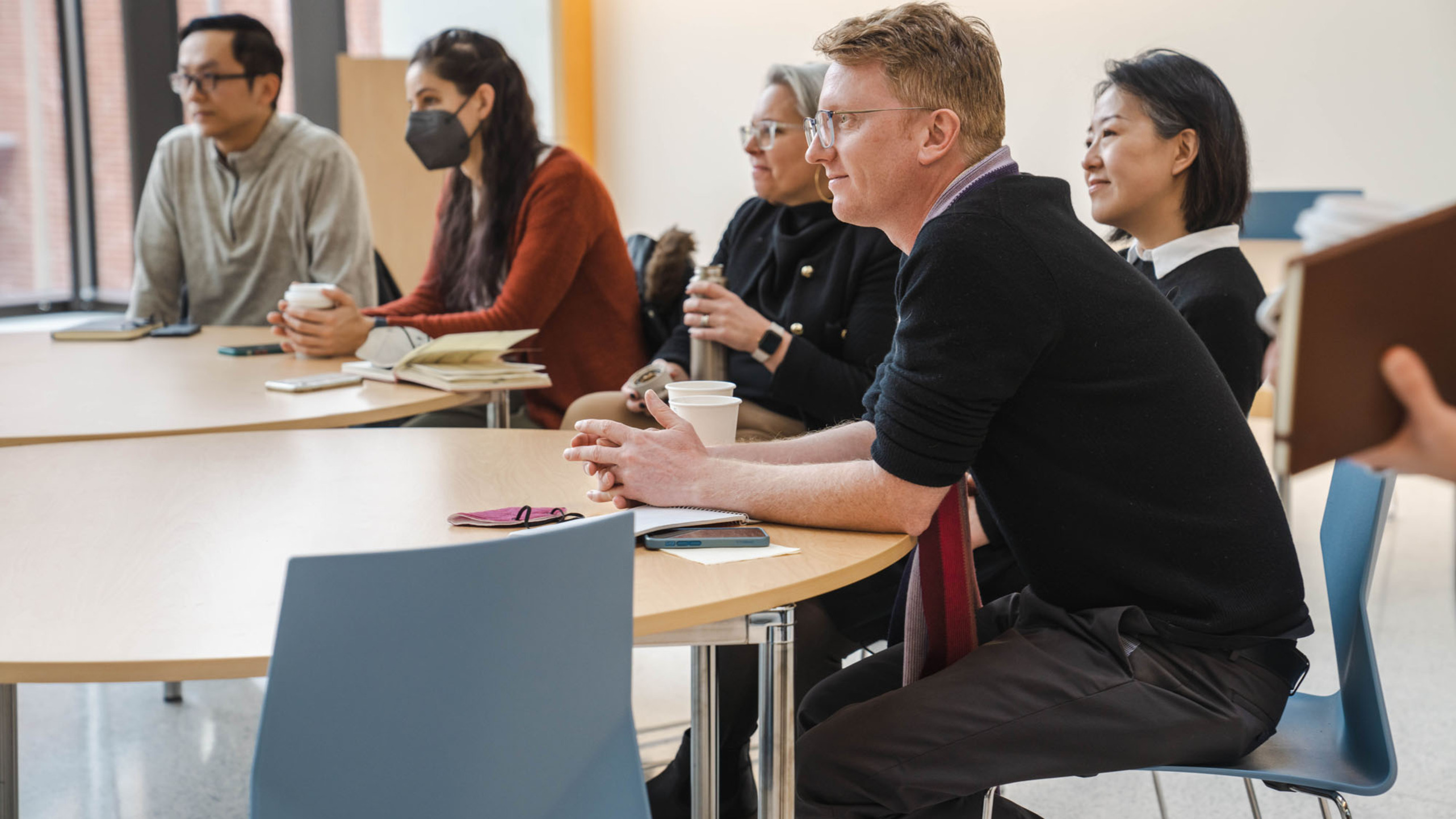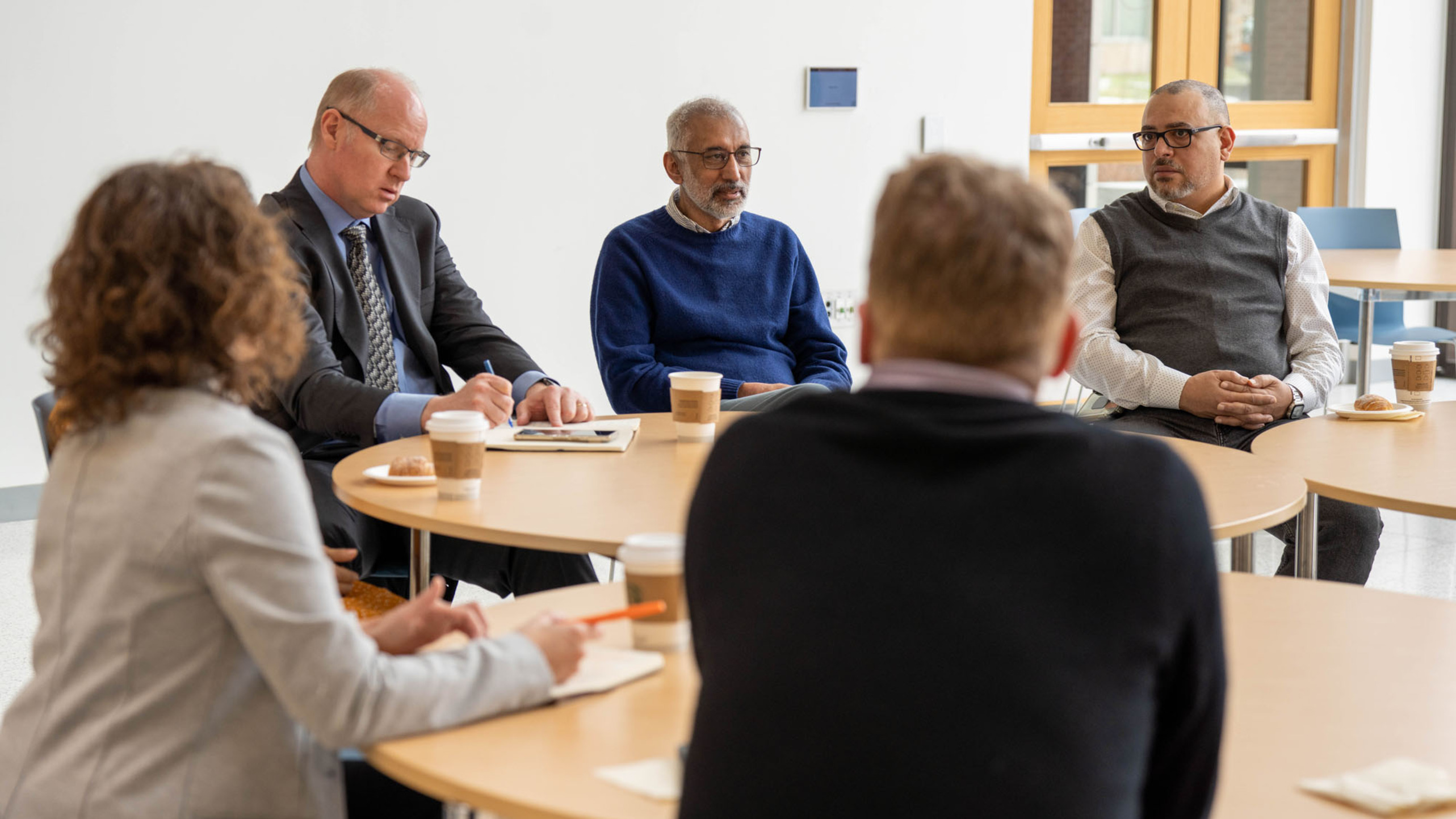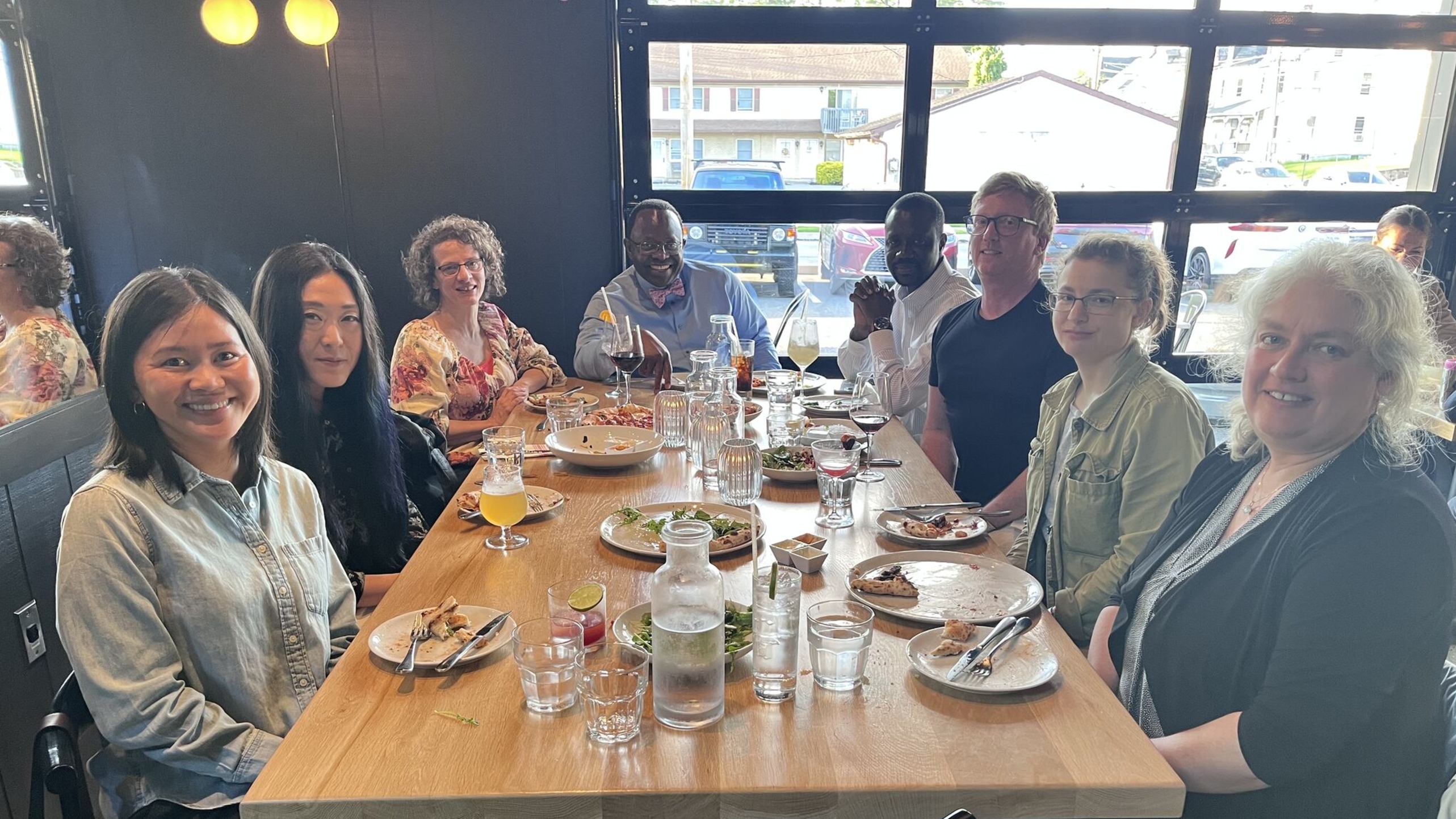To build the Lehigh of the future, Lehigh University launched the Advancing Future Faculty Development Postdoctoral Scholars Program (“AFFDP”). The AFFDP is designed to create professional opportunities for scholars who desire to pursue a tenure track assistant professorship and who will actively contribute to Lehigh’s Principles of Our Equitable Community.
By welcoming applications from scholars of all backgrounds who are ready to contribute to an environment of belonging, the AFFDP helps fulfill Lehigh's promise to promote a learning environment that is free from discrimination and celebrates the richness of a community open to all. Hosting these scholars supports their individual growth, cultivates inclusive excellence throughout the Lehigh community, and enhances the depth and breadth of the academy.
Scholars who are selected for the program receive support and mentoring to develop a portfolio of experiences and scholarship or creative works to prepare them for the professoriate. Following two (up to three) years of a successful postdoctoral experience, an AFFDP scholar will have the opportunity to be considered for a tenure-track Assistant Professor position in a relevant Lehigh department or apply elsewhere.
We seek excellent candidates with a range of experiences from all backgrounds. Eligible applicants will have earned their doctoral degree within the past three years prior to the initial appointment at Lehigh, and they will indicate which Qualified Host unit should review their application.
Meet the first cohort, arriving in Fall 2023, here.
Meet the second cohort, arriving Fall 2024, here.
Meet the third cohort, arriving Fall 2025, here.
Applications for the Fall 2025 cohort closed on January 1, 2025 and we will not be recruiting for a 2026 cohort.
We will provide additional information about the Program at a future date.
About the Program
Aligned with Lehigh University's Principles of our Equitable Community, the goals of the Advancing Future Faculty Development Postdoctoral Program are to:
- create a more inclusive academic experience for all students and faculty at Lehigh, or similar institutions, by accepting and developing outstanding scholars who have a demonstrated commitment to cultivating and contributing to Lehigh’s Principles of Equitable Community.
- provide enriching research experiences and pre-faculty professional development in a top-notch and collaborative environment to outstanding postdoctoral scholars from a range of backgrounds and experiences who aspire to be faculty at Lehigh, or similar institutions.
- welcome each scholar into an academic setting prepared to provide resources, infrastructure, and relationships necessary for future faculty career success.
- enhance research creativity and productivity through networked opportunities that improve the learning environment, research collaborations, and capacity of all our members.
- enhance the breadth and depth of the academy by preparing future faculty.
- Talented scholars interested in pursuing the professoriate, especially at Lehigh, should apply to this program to make fast gains in establishing their independent research careers. This program will strongly benefit scholars with a commitment to mentorship, professional development specific to research/creative works, and teaching areas of interest.
- Scholars will have a competitive salary (minimum $66,000), full employee benefits (including contributions to retirement), and $10,000 per year professional funds for use towards conferences, travel, professional development, research supplies, etc. Up to $2,000 of the professional development funds can be used for relocation, following federal tax and university policy.
- Participating scholars have access to the Lehigh University Office of Postdoctoral Affairs and the programs and community it offers.
- Scholars, with endorsement of their mentors, departments, and dean, will have the opportunity to be considered for assistant professor positions.
- Applicants must hold a doctoral degree in any of the disciplines at Lehigh University by the time of the appointment.
- The doctoral degree should have been earned within the last three years prior to potential appointment; however, if the degree was earned before that, explain why this program makes sense given the scholar's situation. Some disciplines may consider scholars pursuing a second postdoctoral fellowship if the program would make them faculty-ready within three years.
- If the candidate's PhD was earned at Lehigh, they may be eligible. Scholars may have postdoctoral appointment elsewhere, or they may apply to a department outside the one in which their PhD was earned. Please reach out to advance@lehigh.edu if you have other questions.
- Applicants must have a proven commitment to actively contributing to Lehigh’s Principles of Our Equitable Community. Those with a demonstrated interest in contributing to an environment that embodies inclusive excellence are strongly encouraged to apply.
- Candidates must be authorized to work in the USA at the time of appointment. The application will ask: (1) do you have US work authorization? and (2) do you/will you need visa sponsorship?
- Current Lehigh University postdoctoral associates are eligible if they will have one year or less postdoctoral experience before the potential appointment.
- Current Lehigh University Visiting Assistant Professors are eligible.
- Individuals currently working at Lehigh University as Teaching Assistant Professors are not eligible.
A qualified host unit (department or program or research institute, for example) is one that has demonstrated a track record and continuous plans for cultivating a supportive and professional environment for AFFDP scholars to thrive. Departments must put forward documentation to the dean and Executive Committee in the form of a "Proposal to Host" plan in Infoready. All departments /academic units can be qualified hosts. Where department is used here, we refer to the main scholarly unit of hire, scholarly contribution and evaluation. The concepts about host unit readiness relate to work by Edwards et al., 2000; Carter-Veale, et al, 2025, and Culpepper et al., 2021.
The Proposal to Host plan must:
- describe attributes of the department's supportive environment and ongoing commitments and activities to advance the Principles of our Equitable Community.
- detail how the new postdoctoral scholar will be welcomed and onboarded.
- describe teaching expectation, if any, for the postdoctoral appointment period.
- articulate preliminary mentorship and professional development commitments (via mentoring plan; Future Faculty Development Plan, FFDP).
- describe the resources for completing the research necessary to be successful and the sources of funding as appropriate (money, lab and office space, instrumentation or computing expectations, etc.).
- describe financial resource commitment for salary and benefits (50% cost share with the Program) to attract and ultimately retain scholars through the postdoctoral period.
- describe what resources are going to be provided by different parties: by each the department and the college.
- outline the vision for the path for the scholar to be considered for a Lehigh tenure track position including criteria for hireabilty and the timing of the necessary reviews with the dean. This path to the professoriate should include deliverables for which mentoring by the host unit can yield a successful outcome. It should also include the ideal time table for the transition to faculty process.
- include a recruitment plan for the search for postdoctoral applicants.
Proposal making can involve consultation with the Program's Executive Committee before the due date. Individual FFDPs will be customized based on the needs of the interviewed scholars who are selected for appointment and then finalized after appointment.
Successful applicants for the Program will be selected on the basis of scholarly promise and potential to contribute to the pursuit of the educational benefits of an inclusive campus community within the research areas proposed by qualified host units.
Applicants must have completed their terminal degree by the time of appointments.
Learn about the scholars hired in each cohort. Their profiles will be updated to reflect important career outcomes following the AFFDP period. Read about Cohort 1 (Fall 2023), Cohort 2 (Fall 2024), and Cohort 3 (Fall 2025).
Roles, Expectations and Terms
The Executive Committee partners with the ADVANCE Center, deans, departments and programs in the following ways:
- screens applications and routes files for review
- reviews Proposals to Host department, and suggests recommendations for improvements, if need be, so the final plans are comprehensive and strong
- ensures postdocs engage in meaningful research/creative activities, professional development, (and teaching where applicable) setting them up for successful future tenure-track positions at Lehigh or elsewhere.
- considers the Individual Future Faculty Development Plans and the mentee and mentor semester reports which may then inform feedback or recommendations to the dean's office, departments and programs in order to support the needs and development of the postdoctoral scholars.
- advises on and/or plans the suite of postdoctoral professional development events for the cohort
The current members of the Executive Committee are: Drs. Marci Levine, Henry Odi, Dominic Packer, and Joan Ramage.
Departments, Programs and Research Institutes, even Colleges can host a postdoctoral scholar in this program. Where department is used here, we refer to the main scholarly unit of hire, scholarly contribution and evaluation.
- Current faculty members are expected to cooperatively submit a Proposal to Host. A Guide for the Proposal to Host can be found on Infoready. They should confer with the dean early and demonstrate alignment for this method of recruitment across department and college goals. Departments with questions or seeking guidance on the Proposal can contact advance@lehigh.edu. Apply on Infoready.
- The Department Chair of a host department is accountable for the plan described in the accepted proposal and for experience of the hired postdoctoral scholar, and thus:
- will ensure they are smoothly onboarded.
- will meet regularly with the mentors and also with the mentees to discuss and align expectations, goals, and progress.
- should coordinate with the mentor(s) to welcome and network the fellow across the Lehigh Community.
- can use guides for these expectation and progress monitoring conversations (will be found in the Hosting Guide).
- Current faculty are expected to play an active role in integrating the postdoctoral scholar into the life of the department, program, or research institute.
Mentors will meet regularly with the fellow to help establish connections, professional goals, and discuss progress. Guides for these meetings, including the faculty development plan and templates for mentor reports will be provided to mentors.
Mentors will also meet regularly with the department chair.
Mentors will complete semesterly reports.
Each postdoctoral scholar is expected to be in residence at Lehigh University, per the operating status of the University.
Upon acceptance, postdocs will be contacted about onboarding.
Postdocs will meet regularly with their mentor(s), usually weekly; and meet at least once per semester with the department chair.
Each Postdoc will create an Individual Future Faculty Development Plan with their mentor(s). This should be reviewed each semester and submitted to advance@lehigh.edu. Plans should be organized to support establishing goals and aligning resources or opportunities for the following domains:
- developing your research/creative work towards independent scholarship
- teaching work (if it is part of overall expectations)
- professional development goals through participation in department and college meetings, other events or utilization of resources
As the AFFDP is designed to help the postdoctoral scholar build a research portfolio toward their future academic success, it will be up to the department to determine if and how much the scholar is required to teach courses at Lehigh University (maximum one course per year). For those that are not instructors of record, they may deliver occasional guest lectures, for example. Even if the agreed to development plan does not include teaching courses, the postdoctoral scholars are expected to participate in professional development about teaching and learning.
Expectations for producing research/creative works are the main priority of this postdoctoral experience. Thus, each fellow is expected to present at least one research seminar or colloquium on the Lehigh University campus during each academic year of the fellowship. They should also present their work at a national or international conferences.
Postdocs in this program are encouraged to participate in grant and foundation proposal writing and in outreach activities, in addition to the customary activities of postdoctoral fellows of research, publication, and presentation.
AFFDP Scholars will complete a semesterly report.
Lehigh University will provide the Program's postdoctoral scholars placement in at least one host laboratory, academic program, or department in their area of academic interest or specialty. Scholars will have an office, computer, phone, and access to the libraries and related tools for research. The faculty members and the host department chairs agree to furnish the laboratory and/or office space, supplies, and access to needed equipment and research supports for the scholar's proposed research/creative work and/or teaching for the entire period.
Lehigh University will provide the scholar with at least one faculty member to serve as a mentor.
Lehigh University will appoint each Postdoctoral Scholar for a 12-month term with the potential to renew for two or possibly three additional years. Scholars whose appointment begins at the start of the 2024-2025 academic year will receive an annual salary of $65,000 plus health care benefits, as well as $10,000 toward conference travel and other research-related and professional development expenses. Up to $2,000 (taxable, and per policy) can be used for relocation.
Scholars who are successful in the AFFDP may be considered for faculty appointments at Lehigh University. They are not required to accept a faculty appointment as a condition of their appointment, nor is the university obligated to offer a faculty appointment upon completion of the program. The program is intended as a step towards development as a potential faculty member at Lehigh University or another institution of higher education.
Cohort Process for Review and Selection
- November, Application open. Executive Committee reviews and routes complete applications to prospective unit and corresponding dean as suggested by the application.
- January 1, Applications due. Letters of Recommendation may be submitted until January 15.
- January-April: On campus interviews (up to 2 days, with prospective faculty mentors, department chair, director, dean, faculty collaborators and Executive Committee).
- May: Letters announcing decision, including offers of selection, sent to finalists.
- Two weeks after letters sent to finalist: Signed acceptance from postdoctoral scholars due.
- Summer: Newly appointed postdocs should anticipate some onboarding prior to physically reporting to campus for start date. Newly appointed postdocs should review this information in anticipation of their arrival.
- July-October: Start date, as agreed. Flexibility is possible in the start date between 1 July and 30 October, though it is ideal to start early in the academic calendar for fall professional development and mentoring.
These are estimated dates, depending on scale of interest and other factors, exact dates may be modified. Departments expressing formal interest will be updated of changes directly.
- September 15: Proposal to Host opens. Remember proposal preparation should be thought of as a cooperative process and may be revised and approved after an iterative consultation with the program's Executive Committee to increase the likelihood of a successful match and experience for all.
- October 15,: All consultations complete and Proposal to Host due
- October 30: Departments notified and job ad language finalization begins.
- November: Call for postdoc applications opens with agreed department specific job ad language
- January 1,: Postdoc Applications Close and Reviews begin (complete applications routed to indicated department)
- January-April: campus interviews expected. Final evaluations and recommendation for selecting postdoc submitted. This includes any customized updates to the recommended postdocs' onboarding and career development plans
- June:: Decision letters and offer letters go out to applicants after final review of plans (mentoring and financial)
- Summer: Onboarding begins in anticipation of start date between 1 July and 30 October, though it is ideal to start early in the academic calendar for fall professional development and mentoring.
Appreciations and References
It is important to recognize the range of nationwide programs and national and local expertise and support which informed this approach at Lehigh University.
This initiative at Lehigh University was proposed and championed by Drs. Sirry Alang, Kristen Jellison, Shalinee Kishore, Joan Ramage, Jennifer Swann, and Peter Zeitler.
We also wish to thank Dr. Autumn Reed and Dr. Dawn Culpepper for their time discussing their research and insights.
Photo credit on this page: Christa Neu



